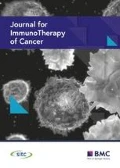Background
Non-clinical and clinical combination studies with GVAX and live-attenuated, double-deleted (LADD) Listeria monocytogenes strains engineered to express tumor-associated antigens resulted in survival benefit and induction of cellular mediated immune responses.
Methods
In a Phase IIa randomized study, patients with metastatic pancreatic ductal adenocarcinoma (PDA) treated sequentially with two vaccine-based immunotherapies demonstrated extended overall survival (OS) with tolerable side effects. Treatment included low-dose cyclophosphamide (CY) followed by GVAX pancreas, an irradiated GM-CSF-secreting allogeneic PDA cell vaccine, and subsequent administrations of CRS-207, a LADD vaccine engineered to express mesothelin. Study inclusion criteria were diagnosis of metastatic PDA, refusal or receipt of > 1 prior chemotherapy, ECOG 1 and adequate organ function. 90 patients were randomized 2:1 to receive 2 doses of CY/GVAX followed by 4 doses of CRS-207 (Arm A, median OS 6.1 months) or 6 doses of CY/GVAX (Arm B, median OS 3.9 months) (HR=0.54, one-sided p=0.011).
Results
As of June 2015, 7 patients remain alive. Two patients continue on treatment: 1 original Arm A treatment (35.6 months on treatment); 1 Arm B on the 4th course of rollover treatment (32 months on treatment). Five patients are currently in follow-up (Arm A) with a median time since first treatment of 36.1 months (range, 30.0 to 39.5 months). Peripheral blood mononuclear cells and serum were collected at baseline and over the course of treatment for immune monitoring and biomarker analysis. Here we report systematic cellular immunophenotyping and serum protein profiling in a sub-cohort of 38 PDA patients enrolled in this study. Mass cytometry and Luminex analysis of this sub-cohort revealed candidate biomarkers at baseline that were predictive of clinical outcome. Analysis of longitudinal time points using mass cytometry, flow cytometry, Luminex, Western blotting and ELISA are ongoing to identify mechanistic biomarkers that correlate with survival.
Conclusions
These findings may inform future efforts to identify patients with productive responses that are most likely to benefit from immune-based therapy.
Clinical trial information NCT01417000
Author information
Authors and Affiliations
Rights and permissions
This article is published under an open access license. Please check the 'Copyright Information' section either on this page or in the PDF for details of this license and what re-use is permitted. If your intended use exceeds what is permitted by the license or if you are unable to locate the licence and re-use information, please contact the Rights and Permissions team.
About this article
Cite this article
Nair, N., Lemmens, E., Enstrom, A. et al. Long term survivors and immune biomarker analysis of Phase IIa, randomized study of GVAX pancreas and crs-207 immunotherapy in patients with metastatic pancreatic cancer. j. immunotherapy cancer 3 (Suppl 2), P102 (2015). https://doi.org/10.1186/2051-1426-3-S2-P102
Published:
DOI: https://doi.org/10.1186/2051-1426-3-S2-P102

